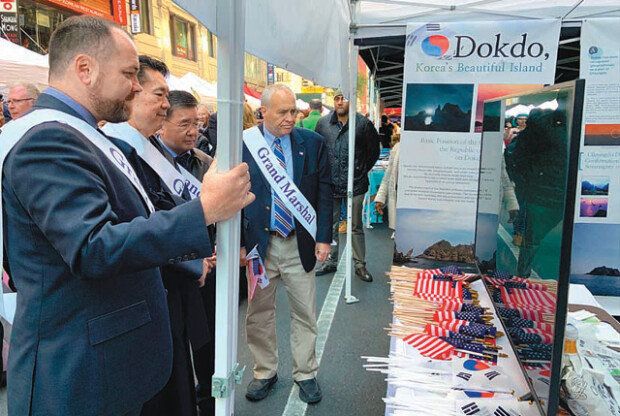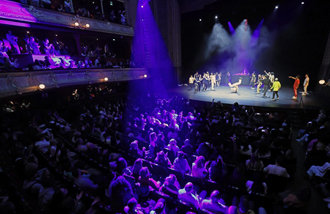Korean-Americans publicize Dokdo and East Sea in New York
Korean-Americans publicize Dokdo and East Sea in New York
Posted October. 07, 2019 07:21,
Updated October. 07, 2019 07:21

Sixth Avenue near Koreatown in Manhattan, New York was closed to traffic in the afternoon on Saturday (local time), which was World Korean Day. Koreans in the country’s traditional outfit, “hanbok,” gathered on the street. The 39th Korean Parade began with the march of participants, including the Korean traditional music band called “Chita,” Korean groups, including the Korean American Association of Greater New York, and the members of the Baekje Cultural Festival committee visiting from South Korea.
“Korean Festival” was held showcasing K-pop and traditional dance on 32nd Street where Koreatown is located. Among those who came to congratulate the festival were President Charles Yoon of the Korean American Association of Greater New York, Korean Consul General in New York Park Hyo-sung, and local politicians. The participants confirmed their commitment to strong relationship between South Korea and the U.S. by mixing bibimbap enough for 500 people prepared by the Eastern United States Korean Cuisine Globalization Committee. In addition, a gala show showcasing the four seasons of Baekje was staged by the Baekje Cultural Festival committee, garnering locals’ attention.
An outdoor market and promotion booths along 32nd Street to introduce traditional cuisine and ingredients, such as seaweed, of Korea were also visited by many citizens and tourists. A booth to publicize Dokdo and the East Sea was also set up for the first time this year. The Korean American Association of Greater New York explained that the booth was prepared to publicize the correct names of the two South Korean territories in the U.S.
“South Korea’s traditional performances, including Baekje’s traditional ’Mimaji’ dance performance, was received so well by New Yorkers, which showed a possibility for another type of the Korean Wave,” said President Yoon of the Korean American Association. “Next year’s festival will be even better than this year to celebrate its 40th anniversary.”
The Korean Parade in New York began in 1980. The state of New York designated the first Saturday of October as its “Korean Day.” It has now become one of New York’s representative street festivals by showcasing various sides of the Korean culture, including traditional music, performance, and cuisine.
Yong Park parky@donga.com







